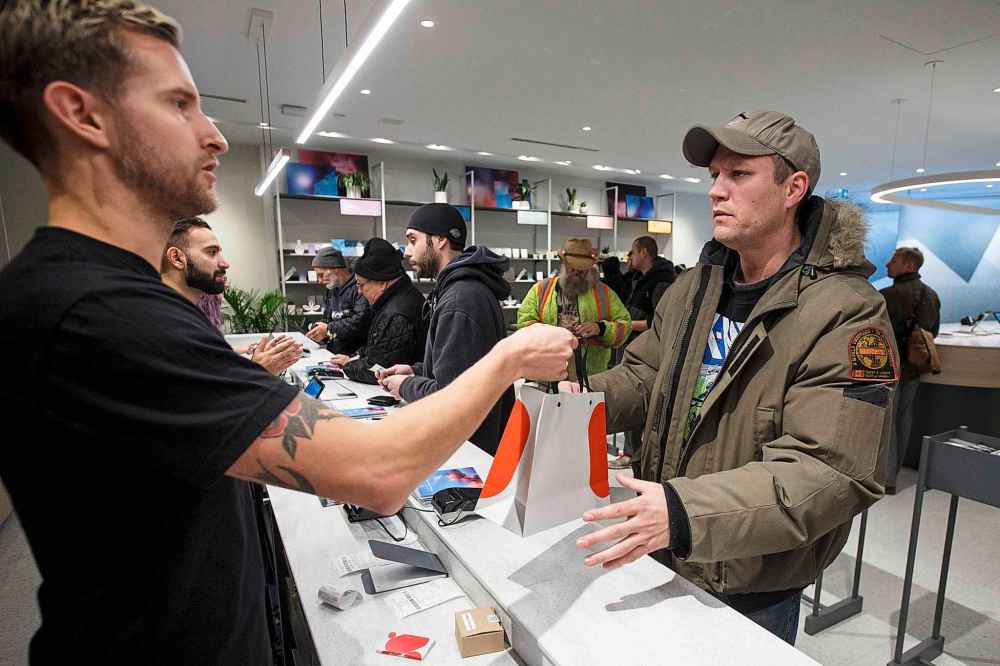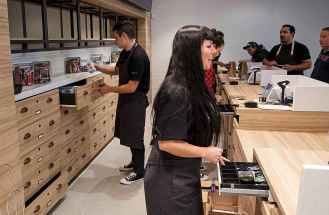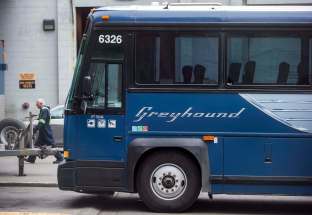Manitoba’s cannabis workforce on the grow More than 500 people directly employed by new industry
Read this article for free:
or
Already have an account? Log in here »
To continue reading, please subscribe:
Monthly Digital Subscription
$0 for the first 4 weeks*
- Enjoy unlimited reading on winnipegfreepress.com
- Read the E-Edition, our digital replica newspaper
- Access News Break, our award-winning app
- Play interactive puzzles
*No charge for 4 weeks then price increases to the regular rate of $19.00 plus GST every four weeks. Offer available to new and qualified returning subscribers only. Cancel any time.
Monthly Digital Subscription
$4.75/week*
- Enjoy unlimited reading on winnipegfreepress.com
- Read the E-Edition, our digital replica newspaper
- Access News Break, our award-winning app
- Play interactive puzzles
*Billed as $19 plus GST every four weeks. Cancel any time.
To continue reading, please subscribe:
Add Free Press access to your Brandon Sun subscription for only an additional
$1 for the first 4 weeks*
*Your next subscription payment will increase by $1.00 and you will be charged $16.99 plus GST for four weeks. After four weeks, your payment will increase to $23.99 plus GST every four weeks.
Read unlimited articles for free today:
or
Already have an account? Log in here »
Hey there, time traveller!
This article was published 30/10/2018 (2602 days ago), so information in it may no longer be current.
More than 500 people are now directly employed by Manitoba’s legal cannabis industry, according to a Free Press survey of companies involved in producing and selling marijuana in the province.
Many of those jobs involve horticulture or retail, but there are other roles to play.
“Cannabis is becoming an industry, and just like every industry, it needs accountants, it needs lawyers, it needs salespeople, it needs people who can run operations,” said Katrina Ingram, chief operating officer of Alberta-based cannabis recruitment firm Cannabis at Work.

“So it’s going to need all the same types of roles that you would find in pretty much any industry.”
Employment figures provided by Manitoba’s biggest cannabis employer, Delta 9 Cannabis, illustrate that point. Delta 9 currently employs a total of 153 people, with 115 workers at its east Winnipeg office and production site filling roles including administration, management, customer service, sanitation, and security.
Another 38 employees are involved in the company’s retail operation, including an Osborne Village medical cannabis clinic and a recreational marijuana store in St. Vital.
Delta 9 said it expects to have 268 staff by year’s end, after hiring about 40 more head office staffers and 75 more retail workers for planned stores in Winnipeg, Thompson and Brandon.
“Just on the retail side of things, we have 700-plus inquiries to fill retail positions right now,” said Delta 9 chief executive officer John Arbuthnot.
Manitoba’s next-biggest cannabis producer, Winnipeg-based Bonify, currently employs 40 staff at its North End facility.
GrowForce is building out its growing facility in a former Transcona meat packing plant, and currently employs six staff in Manitoba. GrowForce expects to employ about 150 people in the province by the end of 2019, said director of public affairs Jocelyn Advent.
“You’ll have everybody from entry-level (cannabis) trimmers to horticulture experts, botany, soil sciences, environmental engineering,” she said, citing a range of possible annual salaries of $30,000 to $120,000.
Aside from Delta 9, other legal cannabis retailers in Manitoba currently employ about 100 workers each.
Canopy Growth Corporation said it has 109 employees at its Tweed stores in Manitoba, including staff hired for an upcoming location in Brandon.
National Access Cannabis (NAC) said it has 100 Manitoba employees, mostly working for its Meta Cannabis Supply Co. stores. “And we anticipate doubling that by the end of the year,” said Natalie Wood, director of human resources.
Although only one of NAC’s Meta stores is open so far, Wood said the company is spending money to hire and train its employees well ahead of other store openings.
“As an organization, what we’re looking to do is create work that is interesting, where people can feel like they’re increasing their knowledge, that they’re learning about this new industry, this newly legal product, and that way that propels their career forward,” said Wood.
Retailer Tokyo Smoke also has a workforce of about 100 people in Manitoba, said community manager Molly Karp. That includes about 30 employees for each of its three Winnipeg stores, plus some seasonal staff.

Karp said Tokyo Smoke plans to open a store in Brandon in November, and perhaps a fourth Winnipeg location by the end of the year.
Licensed cannabis retailer Garden Variety doesn’t plan to open stores until 2019. A representative said the company plans to hire its first two Manitoba-based staffers by the end of this year.
Manitobans’ interest in cannabis industry employment spiked leading up to legalization, according to data provided by job search website Indeed.com. Marijuana-related searches peaked during the week surrounding legalization Oct. 17, when about 83 of every 10,000 Indeed.com searches in Manitoba included the terms “cannabis,” “marijuana,” “dispensary,” “weed” or “budtender.” (In weed industry parlance, budtender refers to a cannabis salesperson.)
Cannabis legalization has also led to dedicated jobs at Manitoba Liquor & Lotteries Corp., the provincial Crown corporation that oversees the wholesale distribution of cannabis to licensed retailers. MLL now has three dedicated cannabis buyers, two customer service co-ordinators, and one business analyst, according to a spokesperson.
On the other hand, Manitoba’s cannabis retail regulator isn’t devoting staff exclusively to cannabis.
The Liquor, Gaming and Cannabis Authority of Manitoba has about 90 employees, according to communications manager Kristianne Dechant, and they’ve “all had their roles affected by the addition of cannabis to our regulatory mandate.”
“For example, rather than have cannabis-specific inspectors, all of our inspectors are trained in gaming, liquor and cannabis inspections,” Dechant wrote in an email.
Statistics Canada recently updated its employment classification system to include cannabis jobs, so future data from the national statistics agency could shed new light on the growth of its labour force.
solomon.israel@freepress.mb.ca
Twitter: @sol_israel









